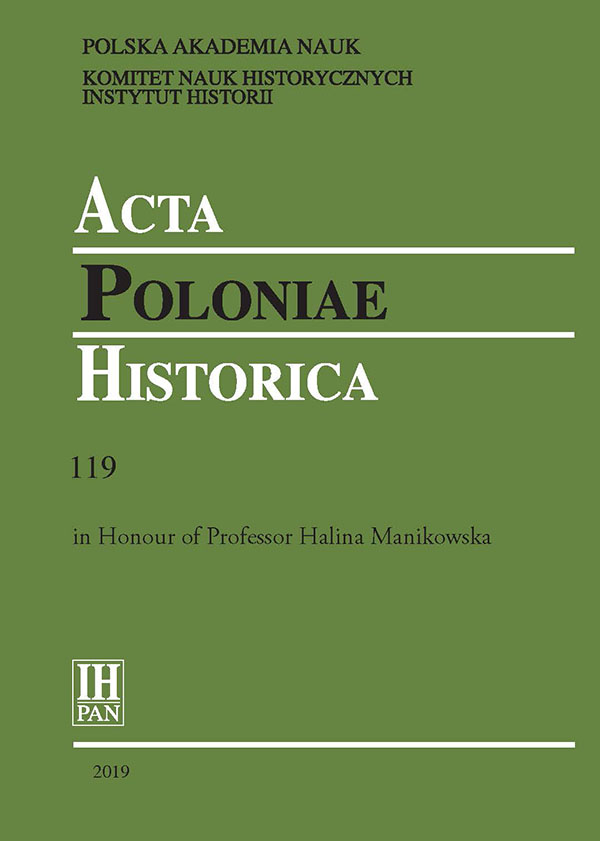Aspects of Economic and Social Life in The Statute of the Commune of Cortona (1325)
DOI:
https://doi.org/10.12775/APH.2019.119.07Słowa kluczowe
Cortona, Casali city lordship, city statute, crafts, guilds, wealth distribution, the condition of women, sociabilityAbstrakt
An ancient Etruscan settlement located in the Valdichiana, along the border between Tuscany and Umbria, Cortona has attracted renewed interest over the last two decades among historians of the Middle Ages and the Renaissance. Falling into this line of research is the publication of the communal statute from 1325, when the government handed the reins of power to the seigneurial regime revolving around Ranieri Casali. In the same year, Cortona became an episcopal seat and thus also gained the status of a city proper. Through a careful analysis of this extraordinarily rich source, the article outlines the salient aspects of the city’s economy and society, with a focus on its environmental resources and urban activities, the distribution of wealth and its poor relief, the condition of women, and the topography of social relations. The picture that emerges from this analysis is that of a lively and dynamic city, arguably at the peak of its development, at a time when many urban centres in Italy and across Europe were already experiencing a downturn after the economic expansion of the Middle Ages.
Bibliografia
Allegria Simone and Capelli Valeria (eds.), Statuto del Comune di Cortona (1325–1380), with introductory essays by Andrea Barlucchi, Pierluigi Licciardello, and Lorenzo Tanzini (Firenze, 2014).
Barlucchi Andrea, ‘L’economia aretina fra Due e Trecento’, in Giovanni Cherubini, Franco Franceschi, Andrea Barlucchi, and Giulio Firpo (eds.), Arezzo nel Medioevo (Roma, 2012), 145–55.
Barlucchi Andrea, ‘L’economia cortonese alla luce dello statuto’, in Allegria Simone and Capelli Valeria (eds.), Statuto del Comune di Cortona (1325–1380), 23–48.
Cardini Franco, ‘Una signoria cittadina “minore” in Toscana: I Casali di Cortona’, Archivio storico italiano, cxxxi (1973), 241–55.
Ginatempo Maria, ‘La popolazione dei centri minori dell’Italia centro-settentrionale nei secoli XIII–XV: uno sguardo d’insieme’, in Federico Lattanzio and Gian Maria Varanini (eds.), I centri minori italiani nel tardo Medioevo: Cambiamento sociale, crescita economica, processi di ristrutturazione (secoli XIII–XVI) (Firenze, 2018), 31–79.
Licciardello Pierluigi, ‘Il culto dei santi e la vita religiosa’, in Allegria Simone and Capelli Valeria (eds.), Statuto del Comune di Cortona (1325–1380), 49–81.
Mancini Girolamo, Cortona nel Medio Evo (Firenze, 1897).
Perol Céline, ‘Cortona, città o centro minore?’, in Giuliano Pinto and Paolo Pirillo (eds.), I centri minori della Toscana nel Medioevo (Firenze, 2013), 127–35.
Perol Céline, Cortona: Pouvoirs et sociétés aux confins de la Toscane (XV–XVI siècle) (Rome, 2004).
Pinto, Giuliano ‘Produzioni e traffici nell’aretino nei secoli XIII e XIV: aspetti e problemi’, Atti e Memorie dell’Accademia Petrarca, nuova serie, lxi (1999), 223–36.
Tanzini Lorenzo, ‘Esercizio del potere e relazioni politiche in una signoria trecentesca: i Casali a Cortona’, Rivista storica italiana, cxxiv, 1 (2012), 442–78.
Tanzini Lorenzo, ‘Lo statuto: aspetti politici e istituzionali’, in Allegria Simone and Capelli Valeria (eds.), Statuto del Comune di Cortona (1325–1380), 3–21.
Vauchez André, ‘Cortona al tempo di Margherita: Aspetti politici e religiosi’, now in id., Francesco d’Assisi e gli Ordini mendicanti (Assisi, 2005), 205–18.
Pobrania
Opublikowane
Jak cytować
Numer
Dział
Licencja
Title, logo and layout of journal are reserved trademarks of APH.Statystyki
Liczba wyświetleń i pobrań: 476
Liczba cytowań: 0



